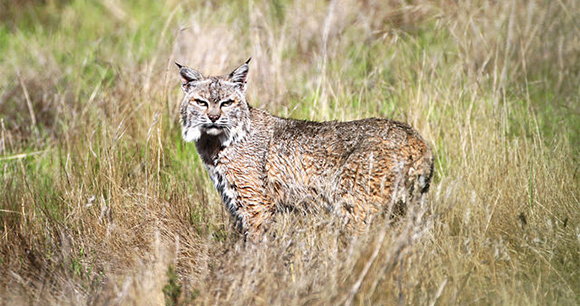
San Francisco, CA—Conservationists sued the US Department of Agriculture’s Wildlife Services today over its wildlife-killing program in Northern California. The lawsuit, filed in federal court in San Francisco, seeks updated environmental analysis of the program’s killing of native wildlife such as coyotes, bobcats and foxes.
The National Environmental Policy Act requires Wildlife Services to rigorously examine the environmental effects of killing wildlife and consider alternatives that rely on proven nonlethal methods to avoid wildlife conflicts. The environmental analysis of the wildlife killing program in northern California is more than 20 years old. According to the complaint filed today, Wildlife Services must use recent information to analyze the impacts of its wildlife-killing program on the environment and California’s unique wild places.
“Wildlife Services’ cruel killing practices are ineffective, environmentally harmful and totally out of touch with science,” said Collette Adkins, a Center for Biological Diversity attorney representing the conservation groups involved in the lawsuit. “It’s long past time that Wildlife Services joined the 21st century and updated its practices to stop the mass extermination of animals. Nonlethal methods for dealing with human-wildlife conflicts have been shown to work. We have no choice but to sue the agency and force a closer look at such alternatives.”
Today’s lawsuit is brought by the Center for Biological Diversity, Western Watersheds Project, the Animal Legal Defense Fund, Project Coyote, the Animal Welfare Institute and WildEarth Guardians. It targets Wildlife Services’ program in California’s North District, which includes Butte, Humboldt, Lassen, Mendocino, Modoc, Nevada, Plumas, Sierra, Shasta, Siskiyou, Sutter, Trinity and Yuba
“Wildlife Services is acting in clear violation of the law,” said Tara Zuardo, Animal Welfare Institute wildlife attorney. “The agency cannot be allowed to continue haphazardly and cruelly killing thousands of wild animals in Northern California each year without weighing more humane alternatives.”
Wildlife Services is a multimillion-dollar federal program that uses painful leghold traps, strangulation snares, poisons, aerial gunning and other methods to kill wolves, coyotes, cougars, birds and other wild animals—primarily to benefit the agriculture industry. Last year the program reported that it killed 1.6 million native animals nationwide, including 3,893 coyotes, 142 foxes, 83 black bears, 18 bobcats and thousands of other creatures in California. Nontarget animals, including protected wildlife such as wolves and eagles, are also at risk from Wildlife Services’ indiscriminate methods. In California, the program continues to utilize leghold traps on animals—despite a state-wide ban on the devices.
“Killing native wildlife at the behest of the ranching industry is morally unconscionable and scientifically unsound,” said Erik Molvar of Western Watersheds Project. “Carnivores play an important ecological role, and exterminating them upsets the balance of nature. We should leave the wildlife alone and change ranching practices instead."
To view the complaint, click here.
Amey Owen, Animal Welfare Institute, (202) 446-2128, [email protected]
About the Animal Welfare Institute
The Animal Welfare Institute (www.awionline.org) is a nonprofit charitable organization founded in 1951 and dedicated to reducing animal suffering caused by people. AWI engages policymakers, scientists, industry, and the public to achieve better treatment of animals everywhere – in the laboratory, on the farm, in commerce, at home, and in the wild. For more information, visit www.awionline.org.
About the Center for Biological Diversity
The Center for Biological Diversity is a national, nonprofit conservation organization with more than 1.3 million members and online activists dedicated to the protection of endangered species and wild places.